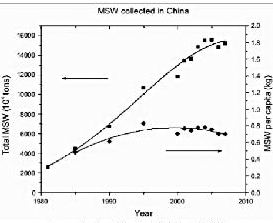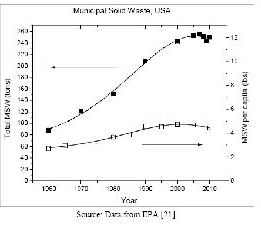
 Today we turn our attention to one of the key areas of responsibility for municipalities (along with their control of traffic and road construction, water supply and local public health)- the collection of solid waste and storage in “city dumps”. The article under review looks at trends in garbage collection, pointing out that cities typically deal with short lived items such as packaging and perishable goods rather than the types of output of industrial waste which may include nuclear waste with lifetimes lasting hundreds of years.
Today we turn our attention to one of the key areas of responsibility for municipalities (along with their control of traffic and road construction, water supply and local public health)- the collection of solid waste and storage in “city dumps”. The article under review looks at trends in garbage collection, pointing out that cities typically deal with short lived items such as packaging and perishable goods rather than the types of output of industrial waste which may include nuclear waste with lifetimes lasting hundreds of years.Reference is made to the early work of the Club of Rome and its 1972 “Limits to Growth” world model, linking the economy to consumption of goods to pollution and waste, warning that, without a change, the global system would decline markedly. New data on waste now indicate that along with a peak in automobile, there now is an observed peak in municipal waste, citing the trends in the world’s leading producers of garbage (and greenhouse gases), China and the USA, a trend observed in other developed countries which is seen to be the result of efforts to reuse products and turn to renewable energy over carbon-based energy sources, as well as to more efficient waste treatment facilities.
Key Quotes:
“MSW generation levels are expected to double by 2025….This assumption is at the basis of choices such as incineration instead of landfilling, since the reduction in volume of the produced urban waste is often seen as a priority”
“Model studies in the field of solid waste exist mainly for specific kinds of waste, e.g., electronics waste ..or automotive waste …, very rarely for the general concept of solid waste or municipal solid waste,”
“the concept that the limits to growth of the global economic system are not determined by “running out” of mineral resources, but by the fact that the industry tends to use the cheapest resources first….a peak in the generation of waste was to be expected in parallel with the general depletion trends of nonrenewable resources.”
“When dealing with municipal waste, we deal mainly with short-lived items, in large part packaging and perishable goods.”
“waste generation in developed countries goes in parallel with the trends of industrial production and that several regions are showing a declining trend which may be interpreted in terms of “peaking” just as it is often done for the production of fossil fuels.”
“it seems clear that better treatment facilities are leading to the recovery of larger amounts of metal which, consequently, do not end up any more in landfills”
“the “waste problem”, in terms of the need of new and expensive facilities may be often overemphasized in the current debate because decision makers still base their planning on the idea of a continuous increase in the amount of waste produced …Instead, if we are seeing a declining trend in the overall mass of waste produced, our priority should become to improve the recycling of solid waste by working towards a closed cycle economy.”





No comments:
Post a Comment